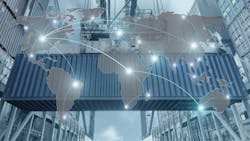Secretary Ross Wants EXIM to Help Manufacturers Boost Exports
Manufacturers might get some help with exporting if US Secretary of Commerce Wilbur Ross has his way.
At the annual conference of the Export-Import Bank of the United States (EXIM) held in Washington this week he appeared, via video, and expressed his view that the bank needs to help the country and its workers.
"The bank is part of a domestically focused trade toolbox that this administration will continue to focus on in the coming months," Ross said "We will use that toolbox to rebalance our trade policy in order to put American workers first."
Ross is looking to the Trump administration to revive the bank, however administration officials have not said whether or not they support his position, according to David Lawder of Reuters.
The first problem that needs to be solved is enabling the bank to lend higher amounts which can create a larger impact on the economy. Currently the bank can only approve loans for $10 million as it lacks a quorum. There are only two active members on the five-seat board. Last April the appointment of a third board member needed to complete the quorum was blocked by Congress.
Ross did not explain how the EXIM will be included in his trade strategy. He also did not discuss whether the administration has specific plans with regard to nominating new board members.
But he asked the manufacturers, lenders and foreign government and company officials attending the conference to work towards increasing U.S. exports to create jobs.
Ross has the support of the National Association of Manufacturers. At the same conference its CEO Jay Timmons said that “manufacturers are strong advocates for the Ex-Im Bank because we see firsthand the difference it makes in people’s lives and livelihoods.”
He pointed out, in an excerpt of his remarks below, that manufacturers can achieve the administration's goals of enlarging the manufacturing sector, but it needs assistance.
As manufacturers, our message is straightforward: we need a fully operational export credit agency to level the playing field. We’re in a global economy, and 95% of the world’s customers live outside our borders. Our competitor nations have robust export credit agencies, and they’re beating us as a result.
If you want to make manufacturing in the United States even greater, we can’t start from a competitive disadvantage.
And we must keep in mind that it’s small businesses that are losing while we’re in a holding pattern. Some small businesses, in fact, have big deals on hold right now because Ex-Im can’t process them. And small businesses stand to lose much more the longer we wait to act. Year after year, 90% of Ex-Im transactions directly support small businesses.
Moreover, the deals with larger companies that the agency can’t make right now…they would also support small companies that are the suppliers for those bigger brands. And I don’t want anyone to lose sight of that as well.
The Export-Import Bank is a great success story. And at a time when manufacturing has captured the imagination of our leaders and the American people, I know our policymakers are eager to implement a strategy that will make our companies as competitive as possible in every market. I see the Ex-Im Bank as a vital component of that strategy.
Now, even with the Ex-Im Bank in the situation that it is, we have reason to be optimistic. In fact, our recent Manufacturers’ Outlook Survey revealed that manufacturers are feeling more positive about the future of their companies than at any time in the survey’s 20 year history.
So the State of Manufacturing is strong. Our industry is diversifying, increasing output and bringing us transformative technologies.
We are charting new frontiers and supporting new jobs. But we could be doing so much more.
And for the first time in a long time, that’s achievable.
